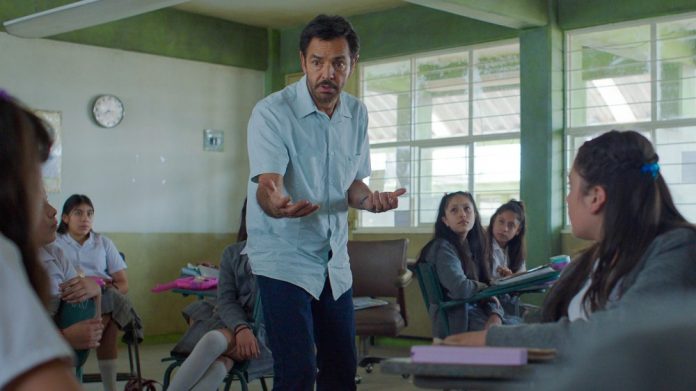It’s been a great few years for actor Eugenio Derbez. Famous back at home in Mexico and in Latin America, he’s had a significant breakthrough with American audiences recently. He appeared in the Oscar-winning Best Picture CODA and stars in the popular Apple TV+ series Acapulco, which is inspired by his 2017 film How to be a Latin Lover and was renewed earlier this year for a third season.
Above the Line had the chance to speak with Derbez about his latest project, Radical, which is now in theaters following its successful launch at the Sundance Film Festival, where it won the Festival Favorite Award. Derbez stars as Sergio Juárez Correa, a sixth-grade teacher in Mexico with an unconventional approach to ensuring that his students are actively engaged in their learning.
Derbez shared the challenges of shedding his established comedy persona, playing a real person, and having to accept notes from the director without overstepping as a producer. He celebrated the chance to work with a talented group of non-actors and particularly the opportunity to tell a positive story about Mexico that feels all too rare in cinema.
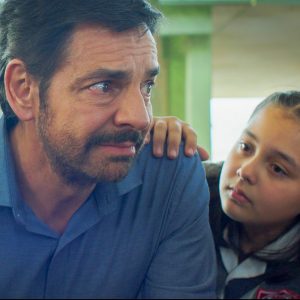
Above The Line: It’s such a pleasure to be able to speak with you. I just watched the film, and it’s such a warm and wonderful movie.
Eugenio Derbez: Perfect. I’m glad you watched it!
ATL: Before we get into the movie itself, I’m curious: what kind of student were you growing up?
Derbez: That’s a great question. I’m glad you brought this up, because, remember that scene where Nico is throwing a pen at the teacher, and then the teacher calls to him and he says, “Don’t change”? I don’t want to spoil anything, but that scene, it was my idea, because when I was at school, I was the clown in the classroom. I was the funny guy in the classroom always making jokes. I remember that my teachers were always telling me or my classmates, “Stop doing that.” They were constantly telling me to grow up. You’re not going to succeed if you continue being just the funny guy, and then, here I am! I was probably training for my real career, so I was a mess when I was at school. It was because I was always getting bored with math or physics or history or any of that. I was more creative, and that’s part of the movie. Every kid is different, so education should be different for each kid. I was the kind of guy that was always bored when it came to mathematics or chemistry or whatever, and I was always thinking about creative stuff. I was the clown of the classroom.
ATL: I had a friend who, when I was doing some teaching, said that it’s much harder when you were the normal typical student, because if you’re the kid who misbehaved in class, you know how to deal with other kids who are misbehaving in class and figure out what are they doing? What do they actually need? They’re not just acting out. What is it that you can do to really connect to them?
Derbez: Exactly. And that line was different when we were shooting. I asked Chris Zalla, the director, I told him, “Chris, can I say instead of, ‘Don’t do it again,’ can I say, ‘Never change, don’t change, keep doing the same thing’? I would have loved for someone to tell me that when I was young, and he was like, “Do it.” So that was me.
ATL: I’m sure a lot of people have mentioned other teacher movies like Stand and Deliver and Dead Poets Society. Do you have any favorites from that genre, and do you think this film fits in with those?
Derbez: Yes and no. Of course, I watched all those movies before doing Radical, because I wanted to get inspired and reconnect with this kind of movie. But I feel this movie is different because, in the other movies, you see that the teacher comes into the classroom and all of a sudden, cut to, they’ve already learned something or they are different. They are getting more involved with the teacher. Here, what Chris wanted to do was to put the audience in the classroom. First of all, the camera is situated at the level of the kids’ eye. It’s always down. He wanted to reflect, what would it be to take the class with the kids? So there’s a long scene where I’m talking about the donkey and about the weight and what floats better, a fat guy or a muscular guy? The director wanted to take the audience through a class to understand the process and to get the audience involved and curious about how come? Why does a balloon not float or float in the air or in the water? Is it the shape or is it the weight, and all these questions that you are asking yourself when you’re watching the movie. That’s what Chris wanted to do, and it’s not in the other movies. So this is the different approach that we have to these kinds of movies.
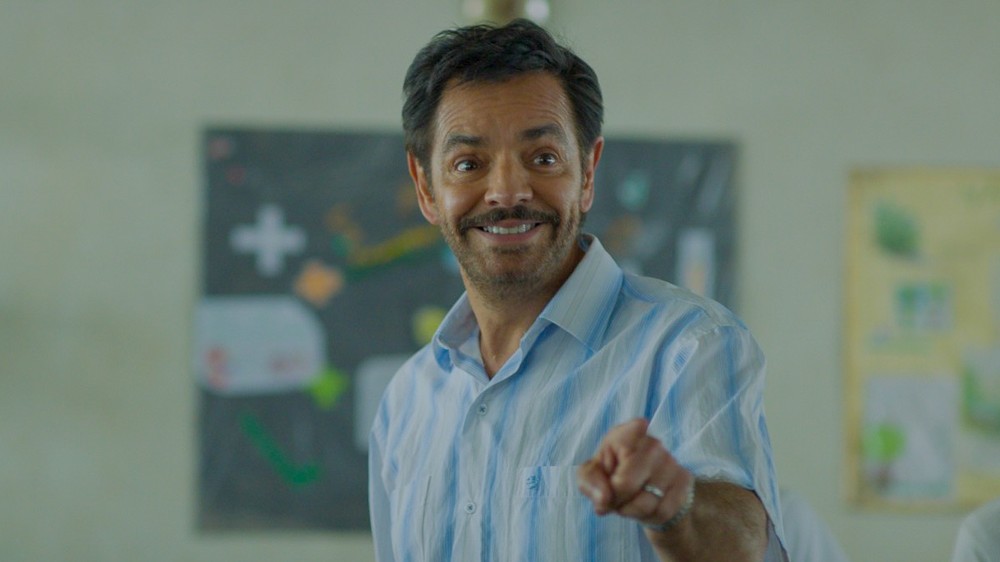
ATL: Can you walk me through the formation of this project, how you first heard about the story of the real Sergio?
Derbez: I was in Mexico in 2012, and I remember that I was watching the news at night. I remember them talking about this twelve-year-old girl from a small public school in Matamoros in Mexico. They said that a US magazine, Wired magazine, was considering her the next Steve Jobs. I was like, “How come? I mean, what’s the story behind this?” They didn’t give a lot of information, and years later, the journalist, who wrote the original article, came to us to offer the rights to make the movie about the story. I immediately remembered that night and that story and then I learned that there was a teacher behind this girl. I said, this is the kind of story that I want to tell. First of all, because it’s really unbelievable that this twelve-year-old girl, who was literally born and raised next to a landfill, in the middle of the trash, got so far. I like to tell people inspiring stories that also have a different side, not just the dark side that we always show in all the Mexican movies, because we’re fed up with Narcos, gang members. I want to put the spotlight now on the good Mexicans, on the good people, the people who make a difference in society.
ATL: Did you know that you wanted to meet with the real Sergio? Was there any idea that maybe you would just want to take what you had heard and craft your own performance without a conversation?
Derbez: Look, when you have to portray or play someone who exists, it’s a big challenge for any actor. But when you have to play someone who’s still alive, it’s threatening, it’s intimidating, because you know he’s going to watch the movie. You need to honor him in a certain way. So I was very worried, but on the other hand, I was able to talk to him and ask him a lot of questions about how he interacted with the kids. I wanted to be as truthful as possible. I was able to ask him, how do you play with the kids? What were the actions or the games or the mechanics or the method that you were applying for them? Everything you see in the movie on screen, it’s basically approved by Sergio and it was based completely in fact and true stories.
ATL: Is there anything that’s substantially different in your performance from who he really is?
Derbez: Well, yeah. We didn’t want to make an impersonation of Sergio. That’s something that I said to the director. He’s not someone who’s well known. He’s not like Abraham Lincoln. We wanted to capture more of his essence and the way he teaches more than trying to physically look like him or make the same mannerism or attitudes. We were more focused on the method and the kind of teaching that he did more than the physical stuff.
ATL: This film has such a fantastic young ensemble. What was it like working with this cast of young children, and was there a lot of improv involved in the scenes?
Derbez: Yeah. The director didn’t want professional actors, so the kids that you see in the movie, it’s their first movie. For many of them, they probably did a commercial or two, no more than that. Nico, for example, he never acted before. He is the son of one of the guys who was handing out flyers in the streets asking for kids if they were interested in doing casting. He was like, come on, come with me, help me. I have to give out these flyers. Then they went to the casting office and when they were there, he said, ah, come on, do the casting just for fun. And then he’s in the movie. So he’s not an actor at all. And, of course, there was a lot of room for improvisation. Actually, we were continuously asking the kids to change the lines, to just stick to the idea of what they needed to say and say it with different words. That’s why you see that they’re so natural, because every time that they were repeating a sentence and it got stiff, we asked them to change the sentence for something else. Especially with kids and especially with kids that are non-actors, you have to handle them in a different way.
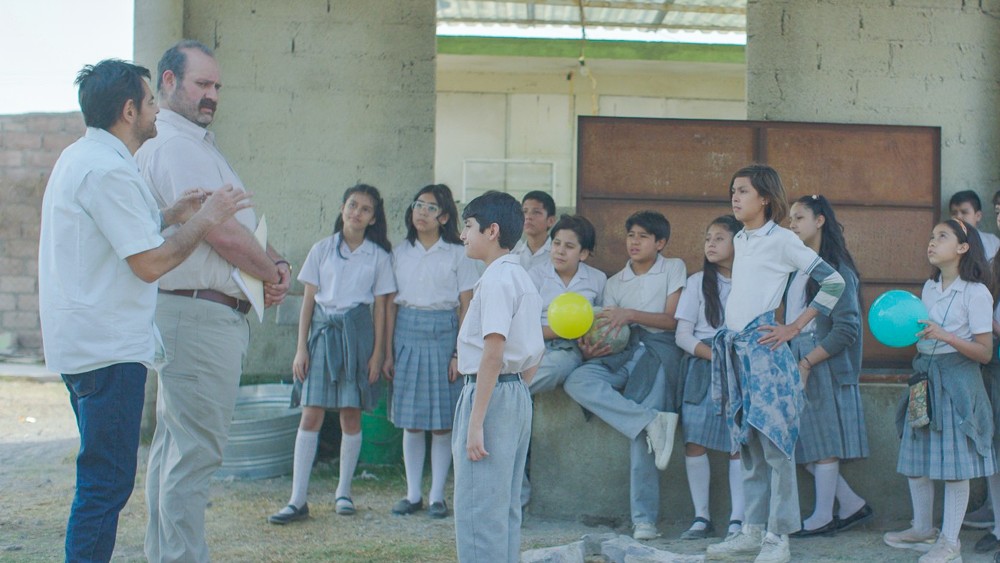
ATL: Have any of the real-life kids, including Paloma, seen the film?
Derbez: Yes. Paloma was with us at the premiere. She actually did a cameo in the movie. She’s the one who’s walking Lupita in the library, when she goes to the big library and there’s a lady who walks her through the John Stuart Mill books, and she says, “Oh, here they are.” That’s the real Paloma. Of course, she watched the movie and she loved it. We wanted this story to be absolutely based on true events. We didn’t want to exaggerate or cut anything, and we wanted to tell the story as close to truth as possible.
ATL: I know that you’re also a director. Do you find that when you’re not the one directing the film, you still have a certain sense of how you want things and try to communicate that?
Derbez: Well, being an actor and director and producer is really hard. I remember that I had this big discussion at the beginning of the movie, because the director wanted me looking like this, just like this. I was telling Chris, you don’t know my audience in Mexico and Latin America, they know me like this. I want them to see a character. I want them to see Sergio, not Eugenio. Please let me change my hair or do something. I can look more like the real Sergio. And he was like, “No, no, no. I want you just like this.” So I felt so naked in a certain way that I went to my business partner and I was like, “Listen, bro, I really need to do something. I don’t feel comfortable just like this. Chris doesn’t know my audience. Blah blah, blah blah blah.” Then he said, “Well, you’re the producer, you can just put your foot down and tell him I’m not doing it,” and I was like, “No! No, no. I’m talking as an actor, and as an actor, I need to pay my director the respect. I don’t want to put on the producer hat and say ‘No, I’m doing what I want.'” So I was very respectful, and that’s the way I am, because I’ve been on the other side when they force you to make a decision because he’s a producer. So I had to obey my director and every time I’m acting, I’m always very humble and obedient with the director. You have to trust that your director, and I think that Chris in this case did an amazing job.
ATL: Do you think that audiences in the US versus Mexico, who might have a different impression of you from the roles they’ve seen you in, will have a different approach to this film as a result?
Derbez: Definitely. Yeah. It’s not the same when you see a new face. When you see someone, imagine – well, the problem with Hollywood is that they know everyone in the entire world. But I’m just a new face in the US. For Latin America, I’m very well-known for my characters. I was trying just to get away from it. I’ve been receiving a lot of nice, beautiful compliments from people where they say I didn’t see Eugenio in this role, because this is my first dramatic role starring in a movie. I love that a lot of people said that I didn’t see Eugenio the comedian. It was very flattering to me.
ATL: I wanted to see this film at Sundance, but I couldn’t fit it into my schedule. I’m so glad that, so many months later, I did, because I heard everyone saying, it’s so great. It’s so wonderful. What was it like premiering the film there?
Derbez: Well, for me it was a big surprise because, even though I was producing it, I had an accident last year that kept me away from everything. I remember it was December, and they told me that the movie was selected for Sundance, and then my business partner asked me, “Do you want to watch it now?” I was like, “No, I don’t want to watch it on the computer or on my television. I’ll wait for Sundance,” so my first time watching the film was at Sundance with an audience. It was one of the best experiences in my career. It was so moving. Everyone was crying and the response from the audience was amazing. So for me it was a great gift to watch the movie for the first time with an audience, and such a beautiful audience like the Sundance Film Festival. It was really magical.
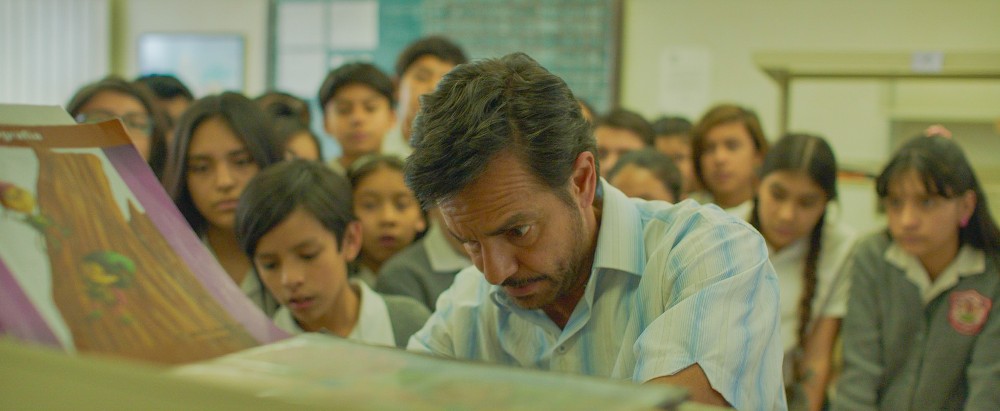
ATL: I’m sure it was nice to be in person after having another big Sundance hit that was only premiering virtually a little bit before that.
Derbez: It was! I can’t believe that, just after CODA, we won the festival again. I feel really lucky, because what are the odds? I’m really happy to see what happened with Radical at Sundance, and now it’s doing great with critics! We already won six festivals. We just won one from the Netherlands. We were competing against Priscilla and Ferrari, and then we won. I’m happy. The audience award – we’ve been winning the audiences awards at all these festivals.
ATL: Does this make you want to do more dramatic roles?
Derbez: Yeah, doing comedy is really hard. They say that it’s harder to make people laugh than to make people cry. I do agree. It’s harder to make people laugh. But for some reason, comedy is not respected, I will say. They never invite a comedy to the festivals or to the awards. You will barely see a comedy in a festival or at the Oscars, for example. Usually, it’s more for dramas. So now, they are inviting me to a lot of festivals, awards, parties that I’ve never been invited to before, so I like it. I feel more respected now. So it’s funny, I might do more drama. I wouldn’t abandon comedy at all, but I would like to at least explore a little bit more dramatic roles.
ATL: I think this film is a fun fusion of the two that there definitely is some lightheartedness in it. It’s very accessible and enjoyable.
Derbez: Yeah, well, I always bring some comedy. No matter what.
Radical is now playing in theaters nationwide.


